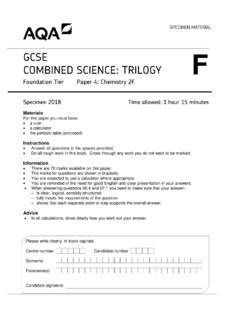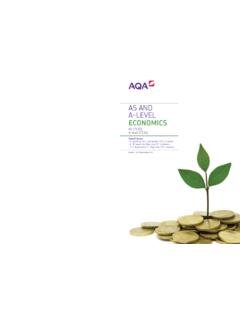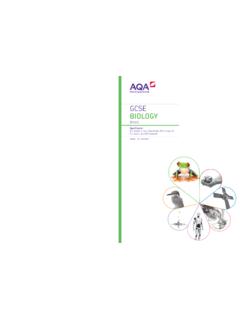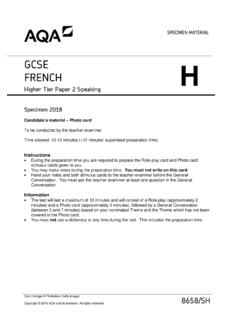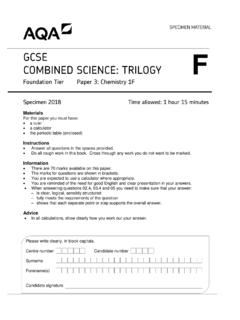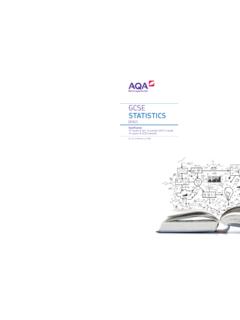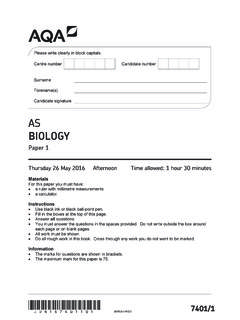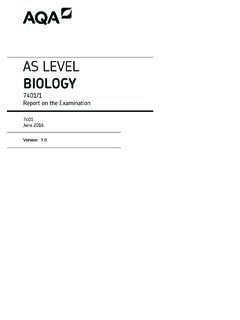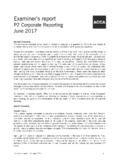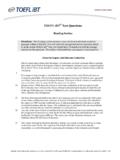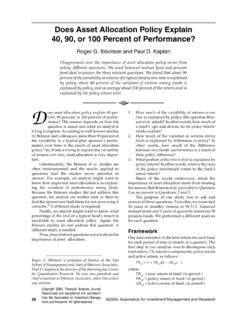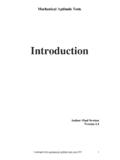Transcription of GCSE Geography Paper 3 Geographical applications Specimen ...
1 This draft qualification has not yet been accredited by Ofqual. It is published to enable teachers to have early sight of our proposed approach to GCSE Geography . Further changes may be required and no assurance can be given that this proposed qualification will be made available in its current form, or that it will be accredited in time for first teaching in September 2016 and first award in August 2018. Specimen ASSESSMENT MATERIAL GCSE Geography Paper 3 Geographical applications Specimen Time allowed: 1 hour 15 minutes Materials For this Paper you must have: a clean copy of the pre-release resources booklet. Instructions Use black ink or black ball-point pen. Fill in the boxes at the bottom of this page.
2 Answer all questions. You must answer the questions on the spaces provided. Do not write outside the box around each page or on blank pages. Do all rough work in this book. Cross through any work you do not want to be marked. Information The marks for questions are shown in brackets. The total number of marks available for this Paper is 76. Spelling, punctuation and grammar will be assessed in Questions and Advice For multiple-choice questions, completely fill in the circle alongside the appropriate answer(s). If you want to change your answer you must cross out your original answer as shown. If you wish to return to an answer previously crossed out, ring the answer you now wish to select as shown. Please write clearly, in block capitals, to allow character computer recognition.
3 Centre number Candidate number Surname Forename(s) Candidate signature CORRECT METHOD WRONG METHODS 2 Version Section A Issue evaluation Answer all questions in this section. Question 1 Issue evaluation Study Figure 1, a map showing the location of ten of the world s top ten megacities (2014). Figure 1 On Figure 1, add the names of the two megacities to the correct boxes. Use the information in the table below. [1 mark] Megacity Latitude Longitude Lagos 6 N 3 E S o Paulo 24 S 46 W 0 1 . 1 3 Version Turn over Which one of the following is the correct latitude and longitude for Jakarta? Shade one circle only. A 21 N 52 E B 30 S 157 E C 6 S 106 E D 33 N 75 E [1 mark] Study Figure 2, Living in an increasingly urban world , in the resources booklet.
4 With the help of Figure 2, suggest why economic factors may be more important than physical factors when explaining migration to cities in LICs or NEEs. [6 marks] Turn over for the next question 0 1 . 3 0 1 . 2 4 Version Study Figure 3, a choropleth map showing the percentage of the urban population living in slums in African countries (2010 estimate). Figure 3 Complete Figure 3 using the information below. [1 mark] Estimated percentage (%) of urban population living in slums: Tanzania 80% What is the estimated percentage of urban population living in slums in Ethiopia? Shade one circle only. A Above 90% B 81 90% C 70 80% D Below 70% [1 mark] 0 2 . 1 0 2 . 2 5 Version Turn over In how many countries shown in Figure 3 is it estimated that between 81 90% of the urban population live in slums?
5 [1 mark] Study Figure 4, Challenges of urban growth in LICs/NEEs , in the resources booklet. Economic development creates environmental problems in urban areas in LICs/NEEs. Use Figure 4 and your own understanding to discuss this statement. [6 marks] Turn over for the next question 0 2 . 4 0 2 . 3 6 Version Study Figure 5, Urban problems in Kolkata - improving the life of the urban poor , in the resources booklet. Suggest one way in which the conditions shown in either Photograph A or Photograph B might affect the health of the urban poor of Kolkata. [2 marks] Study Figure 5, Urban problems in Kolkata - improving the life of the urban poor , in the resources booklet.
6 Suggest why people living in cities in LICs/NEEs such as Kolkata are more vulnerable to natural hazards than people living in cities in HICs. Use Figure 5 and your own understanding to support your answer. [6 marks] 0 3 . 2 0 3 . 1 7 Version Turn over Three projects have been suggested to try and improve the quality of life for the urban poor in Kolkata. These are described in Figure 5. Which of the three projects do you think will improve the socio-economic and environmental conditions for the urban poor of Kolkata most effectively? Use evidence from the resources booklet and your own understanding to explain why you have reached this decision. [9 marks] [+ 3 SPaG marks] Chosen project: End of Section A 0 3.
7 3 8 Version Section B Fieldwork Answer all questions. Study Figure 6, a photograph of part of a river and its valley, and Figure 7, a photograph of part of an urban area. Figure 6 part of a river and its valley Figure 7 part of an urban area 9 Version Turn over Identify two data collection techniques that could be used to carry out a Geographical fieldwork investigation in one of the areas shown. [2 marks] Area chosen: Technique 1: Technique 2: Question 4 continues on the next page 0 4 . 1 10 Version Figure 8 is an isoline map of pedestrian flow in part of London using results from a 5 minute pedestrian count. Figure 8 Complete the isoline for 100 pedestrians shown on Figure 8.
8 [1 mark] Describe the pattern of pedestrian flow shown on the completed map. [2 marks] Suggest one alternative method of presenting the information shown on Figure 8. [1 mark] 0 4 . 2 0 4 . 3 0 4 . 4 11 Version Turn over Explain why the pattern of pedestrian flow shown in Figure 8 may not be accurate. [2 marks] Question 4 continues on the next page 0 4 . 5 12 Version As part of an enquiry collecting primary physical Geography data, a student measured pebble sizes at one location on a beach. The results are shown in Figure 9. Figure 9 Pebble size is measured along the long axis. Sample Pebble size in centimetres 1 12 2 5 3 7 4 9 5 4 6 11 7 9 8 11 9 6 10 13 11 21 Complete the dispersion graph below using the data for Sample 3 in Figure 9.
9 [1 mark] 0 4 . 6 13 Version Turn over Suggest one way in which the data collection technique in Figure 9 could be adapted to make the sample more reliable. [1 mark] Using the data in Figure 9, calculate the interquartile range of the pebble size data. Show your working in the space below. [2 marks] Interquartile range = cm Describe the pebble size data shown on the dispersion graph in Question [4 marks] Turn over for the next question 0 4 . 7 0 4 . 8 0 4 . 9 14 Version State the title of your fieldwork enquiry in which physical Geography data were collected. Title of fieldwork enquiry: Explain the advantage(s) of the location(s) used for your fieldwork enquiry.
10 [2 marks] Justify one primary data collection method used in relation to the aim(s) of your physical Geography enquiry. [3 marks] Primary data collection method: 0 5 . 1 0 5 . 2 15 Version Turn over State the title of your fieldwork enquiry in which human Geography data were collected. Title of fieldwork enquiry: Assess how effective your presentation technique(s) were in representing the data collected in this enquiry. [6 marks] Question 5 continues on the next page 0 5 . 3 16 Version For one of your Geography enquiries, to what extent were results of this enquiry helpful in reaching a reliable conclusion(s)? [9 marks] [+ 3 SPaG marks] Title of fieldwork enquiry: END OF QUESTIONS Acknowledgement of copyright holders and publishers Permission to reproduce all copyright material has been applied for.
